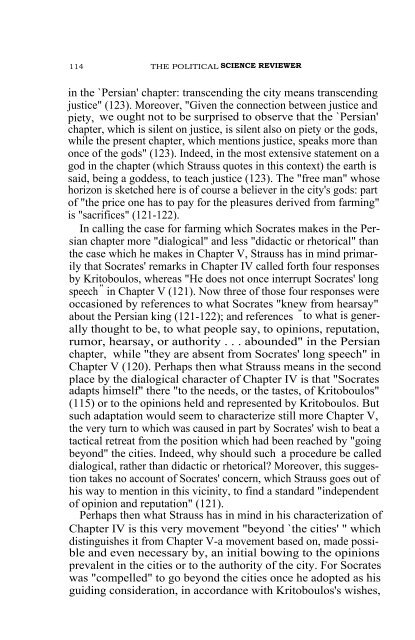Strauss on Xenophon's Socrates Xenophon's Socratic Discourse: An ...
Strauss on Xenophon's Socrates Xenophon's Socratic Discourse: An ...
Strauss on Xenophon's Socrates Xenophon's Socratic Discourse: An ...
Create successful ePaper yourself
Turn your PDF publications into a flip-book with our unique Google optimized e-Paper software.
114 THE POLITICAL SCIENCE REVIEWER<br />
in the `Persian' chapter: transcending the city means transcending<br />
justice" (123). Moreover, "Given the c<strong>on</strong>necti<strong>on</strong> between justice and<br />
piety, we ought not to be surprised to observe that the `Persian'<br />
chapter, which is silent <strong>on</strong> justice, is silent also <strong>on</strong> piety or the gods,<br />
while the present chapter, which menti<strong>on</strong>s justice, speaks more than<br />
<strong>on</strong>ce of the gods" (123). Indeed, in the most extensive statement <strong>on</strong> a<br />
god in the chapter (which <str<strong>on</strong>g>Strauss</str<strong>on</strong>g> quotes in this c<strong>on</strong>text) the earth is<br />
said, being a goddess, to teach justice (123). The "free man" whose<br />
horiz<strong>on</strong> is sketched here is of course a believer in the city's gods: part<br />
of "the price <strong>on</strong>e has to pay for the pleasures derived from farming"<br />
is "sacrifices" (121-122).<br />
In calling the case for farming which <strong>Socrates</strong> makes in the Persian<br />
chapter more "dialogical" and less "didactic or rhetorical" than<br />
the case which he makes in Chapter V, <str<strong>on</strong>g>Strauss</str<strong>on</strong>g> has in mind primarily<br />
that <strong>Socrates</strong>' remarks in Chapter IV called forth four resp<strong>on</strong>ses<br />
by Kritoboulos, whereas "He does not <strong>on</strong>ce interrupt <strong>Socrates</strong>' l<strong>on</strong>g<br />
speech " in Chapter V (121). Now three of those four resp<strong>on</strong>ses were<br />
occasi<strong>on</strong>ed by references to what <strong>Socrates</strong> "knew from hearsay"<br />
about the Persian king (121-122); and references " to what is generally<br />
thought to be, to what people say, to opini<strong>on</strong>s, reputati<strong>on</strong>,<br />
rumor, hearsay, or authority . . . abounded" in the Persian<br />
chapter, while "they are absent from <strong>Socrates</strong>' l<strong>on</strong>g speech" in<br />
Chapter V (120). Perhaps then what <str<strong>on</strong>g>Strauss</str<strong>on</strong>g> means in the sec<strong>on</strong>d<br />
place by the dialogical character of Chapter IV is that "<strong>Socrates</strong><br />
adapts himself" there "to the needs, or the tastes, of Kritoboulos"<br />
(115) or to the opini<strong>on</strong>s held and represented by Kritoboulos. But<br />
such adaptati<strong>on</strong> would seem to characterize still more Chapter V,<br />
the very turn to which was caused in part by <strong>Socrates</strong>' wish to beat a<br />
tactical retreat from the positi<strong>on</strong> which had been reached by "going<br />
bey<strong>on</strong>d" the cities. Indeed, why should such a procedure be called<br />
dialogical, rather than didactic or rhetorical? Moreover, this suggesti<strong>on</strong><br />
takes no account of <strong>Socrates</strong>' c<strong>on</strong>cern, which <str<strong>on</strong>g>Strauss</str<strong>on</strong>g> goes out of<br />
his way to menti<strong>on</strong> in this vicinity, to find a standard "independent<br />
of opini<strong>on</strong> and reputati<strong>on</strong>" (121).<br />
Perhaps then what <str<strong>on</strong>g>Strauss</str<strong>on</strong>g> has in mind in his characterizati<strong>on</strong> of<br />
Chapter IV is this very movement "bey<strong>on</strong>d `the cities' " which<br />
distinguishes it from Chapter V-a movement based <strong>on</strong>, made possible<br />
and even necessary by, an initial bowing to the opini<strong>on</strong>s<br />
prevalent in the cities or to the authority of the city. For <strong>Socrates</strong><br />
was "compelled" to go bey<strong>on</strong>d the cities <strong>on</strong>ce he adopted as his<br />
guiding c<strong>on</strong>siderati<strong>on</strong>, in accordance with Kritoboulos's wishes,

















